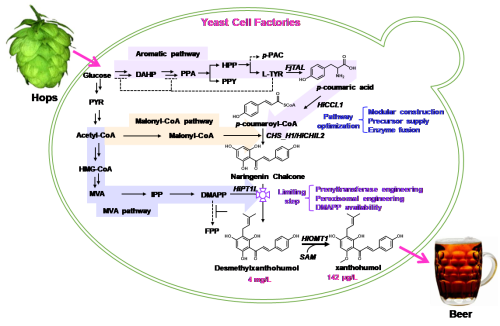The flavonoid xanthohumol, which is an important flavor substance in the brewing industry, has a wide variety of bioactivities.
However, its unstable structure is easily oxidized during the brewing process, resulting in its low content in beer. Moreover, its extraction and purification from plants requires laborious and expensive procedures, and hops cultivation is susceptible to environmental factors.
Recently, a research group led by Prof. ZHOU Yongjin from the Dalian Institute of Chemical Physics (DICP) of the Chinese Academy of Sciences (CAS) has proposed a microbial platform for the de novo biosynthesis of xanthohumol from glucose.
It can synthesize flavonoids, such as the key xanthohumol precursor demethylxanthohumol (DMX) and xanthohumol, owing to balancing the three parallel biosynthetic pathways and enhancing the prenylation efficiency by rewiring the cellular metabolism of Saccharomyces cerevisiae.
This study was published in Nature Communications on Jan. 4.

Engineering the yeast Saccharomyces cerevisiae for biosynthesis of xanthohumol by optimizing the biosynthetic pathway and rewiring the cellular metabolism (Image by ZHOU Yongjin)
The researchers systematically engineered the budding yeast Saccharomyces cerevisiae for an 83-fold improvement in the demethylxanthohumol (DMX) production (4 mg/L) by balancing the three parallel biosynthetic pathways, prenyltransferase engineering, enhancing precursor supply, enzyme fusion, and peroxisomal engineering.
Furthermore, they expressed the last methylation step produced 142 μg/L xanthohumol in shake flasks from glucose.
"Our work constructed a microbial cell factory for biosynthesis of xanthohumol and provided feasible approaches to optimize other complex biosynthetic pathways of natural products," said Prof. ZHOU.